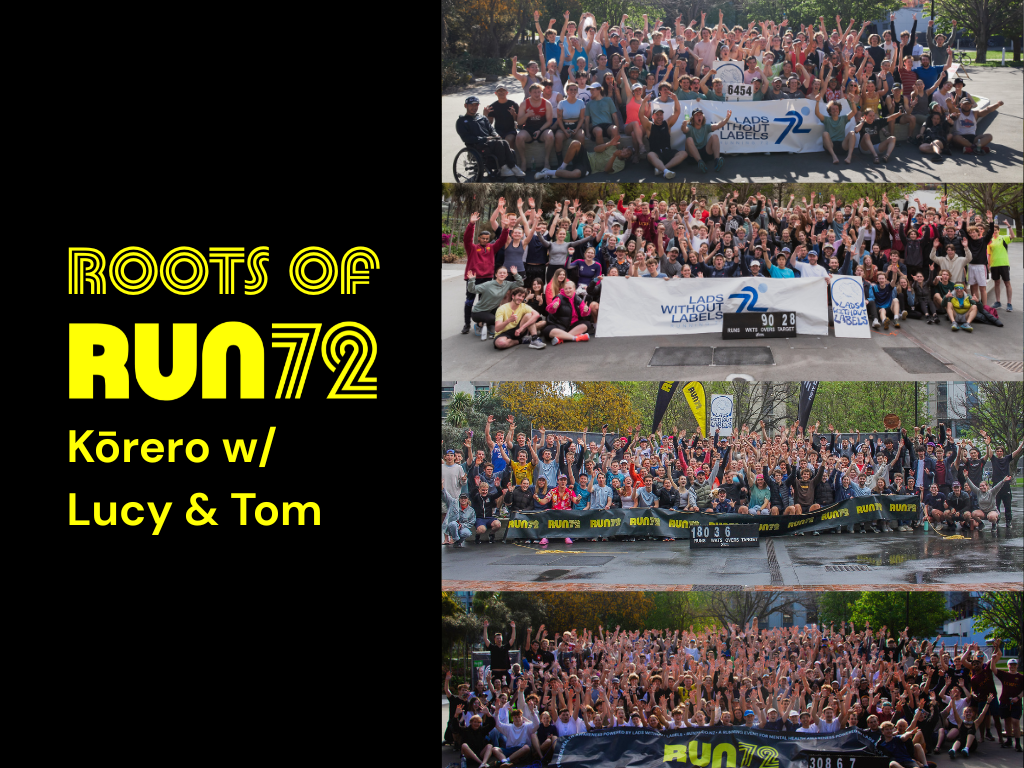WHEN YOU’RE SECRETLY SPOCK: being autistic as a man.
Ricky Townsend unpacks ideas around mental health, relationships, empathy and being autistic as a man.


I was diagnosed with Autism around the age of 3.
As a child I was very textbook of what you’d expect, I didn’t properly speak till the age of 4, I had intense hyper-interests (which I still have), I would have regular meltdowns, had a strong need for routine and struggled with communication and physical contact. Growing up I received lots of help and support from early bird programs and education programs to help me in my development. Considering I now have a university degree it certainly helped me a lot (at least from an academic perspective). I was born in the height of the MMR vaccine/autism scare so my parents had to deal with stigma from other parents for having an autistic child. But now, my experience with autism is different, especially considering most people wouldn’t know I am autistic. There was this certain implicit attitude that I was “cured from my autism”, that I am now “all good”. A view that is easy to internalise and then ask “was I just faking it? Was this all the scheme of a cruel malicious child?” I may not experience the ‘extremities’ of the autistic experience as much now than as a child, but it is still a part of who I am and of my experience in adulthood.
During my time at university, I remember seeing memes and jokes between neurotypical people such as: “mom It’s called sigma male grind set not autism spectrum disorder”. Some of these jokes were sent among people I knew, who were completely oblivious to the implications of these jokes (or me being autistic). This genre of humour seems to have an underlining connotation that an incel is defined by their ‘autisticness’. The idea that incels are lonely, toxic men because they are autistic and do not know how to function socially and so they resort to misogynistic ideology. This has another underlining connotation that if an incel were not ‘autistic’ they would probably not be an incel. To me it seems this implicit attitude has grown to the extent that some autistic men have in fact internalised this and willingly joined the masses of inceldom; as they see their autism as a boundary that separates them from genuine human connection. These people online self-proclaim themselves to be ‘autistcels’.There have been studies that have explored the relationship between autism and incels (which is a messy topic in itself). An online study I came across had almost a quarter of incels self-report as being autistic (out of 250 incels).And there has been a dark track record of incels using autism as a defence after committing violent crimes. So, there is a reason why this stereotype has come about. And it has usually come about in the context of people appropriating autism to allegedly explain or excuse an incel’s immoral actions.
Now obviously I don’t wish to normalise or condone the misogyny of these groups and their thinking. They use women as a scapegoat for their own social isolation, I do not accept this thinking or their rhetoric. But I do find there is a genuine frustration that autistic people have that could potentially explain why small groups of them seem vulnerable into falling into these toxic ideologies.
The reality is that a lot of autistic people struggle to know how to interact with neurotypical people and there are no adequate spaces for us to be ourselves. And this struggle can span from work relationships, friendships to intimate and sexual relationships.
I found this very clearly in the dating scene: there are unwritten rules you’re expected to follow. How much eye contact you must make, what tone of voice you should have. You must learn how to engage in small talk, yet somehow it paradoxically cannot be small talk. Even flirting, I think I understand the basic concept of flirting (in theory) but in reality, it’s confusing and incoherent. Flirting means showing attraction, unless it’s someone who just has a flirtatious personality (which makes things more complicated). Again, you must know how to say things in a certain way with a certain look and if you get it just slightly wrong you come off as a creep. I’ve had people call me out for staring creepily at them, but I didn’t realise I was looking at them at all. A moment that stood out to me was when I was acting in a show and had a scene where I was supposed to lean in for a kiss with my co-actor. I had apparently frightened my co-actor when rehearsing it because I didn’t know I was supposed to close my eyes. Something that may seem obvious to most people but for someone like me was confusing: no one had ever told me that was an important social convention. The inverse is true as well, if someone tries to flirt with me, I’m either oblivious to it or I just feel as if they’re intruding on my personal space.
What I find difficult when discussing this is the natural response for a lot of people is to get defensive. “Yeah, but we all find dating hard.” “But making friends is difficult for everyone.” People like us are accused of being unempathetic, yet those same people do not extend that very empathy to people like us; at least those of us who give off an uncanny aesthetic. I mean, do you really want to be empathetic to that quiet dude in the corner of a party who gives off ‘creepy vibes’? Perhaps the most interesting response I’ve gotten is from someone who argued “maybe autistic men feeling isolated and stigmatized is justified because it makes women feel safe”. So yeah, there is something about this topic that hits a nerve with allistic people. And I get it from a certain angle, if someone seems like a potential threat to your safety then you want to be cautious around them (if not avoid them entirely); I don’t claim to have an answer to this problem because it is difficult. But it is a difficulty that people prefer to sweep under the rug I find.
It is also perhaps doubly difficult because it is strange for some people to seriously consider the idea that the “lonely man in the basement” stereotype could be, in some cases, a product of genuine marginalisation. It can be difficult to be sociable when you forget that you’re supposed to use your face to convey emotions to others when you are talking, you can’t just let your words speak for themselves.
Intimate contact for me is a massive barrier. I remember (and it wasn’t that long ago) I began experimenting in intimate contact with someone and it took a huge amount of work to get to a point where I could make intimate contact without my body shaking uncontrollably. And I’m talking about a span of weeks before I could get to that point. My body goes into a petrified state. I think they were worried they were causing me a perpetual panic attack. Even someone saying something overtly flirtatious was enough for my brain to panic and shut down. These massive anxieties (among others) complicate the whole notion of intimate connection, I must travel at a snail’s pace compared to others. Bear in mind, I’m the sort of person who can struggle with as little as putting a hand on a person’s shoulder, when is that gesture appropriate for example? I remember doing lots of research into how to make intimate contact with someone. It’s impossible for me to go with my gut or my feelings, I need to figure out a routine or system so I can learn how to navigate these bizarre, physical interactions. It’s like learning the steps to a ritual. Relationships overall is a puzzle to figure out. Everyone claims it’s difficult, yet those same people seem to have a much better grasp of it than I do. It’s difficult to feel reassured when someone whose had considerably more dates and been in more relationships than you, tells you that “dating is difficult”. And I’m sure it is still difficult for them, but it’s not an adequate comparison. At this point, I have never been in a proper relationship. In terms of friendship in general, it’s only been the last year or so I’ve made proper closer friendships.
Another aspect of being autistic is that I share traits of alexithymia and can struggle with empathy. It’s only a year or so ago I learnt what the definition of empathy was; I never had a need to understand the concept. Alexithymia is when you struggle to understand or recognise the emotions of yourself or others. Though autism and alexithymia are different, it’s common for them to come together.
On reflection, it’s become clear to me that I experience emotions as purely physical sensations of the body. I struggle to believe that having a happy thought makes me happy or a sad thought makes me sad as I have control over my thoughts. I can fabricate a thought in my head, and so I can be happy and think sad thoughts or vice versa. But the sensations of the body cannot be faked. I cannot trick myself into having the sensations of goodness or badness, so to me that is where emotions lie. I must LITERALLY feel the emotions, in fact I always just assumed people meant it literally.
Now from a rational standpoint, I would argue that I am capable of empathy. I have a strong rational sense of morality and thus will do what I can to try and do the right thing. If someone needs help, I will make the inference that I ought to help them. But what I don’t experience (at least not easily) is the feeling of needing to help or the intuition to recognise the emotional states of others. An interesting example of this for me was when my grandad passed away last year. I just couldn’t see the tragedy of it, and still don’t in all honesty. He was at the point in age where he was struggling to get by day to day. He was nearing the point of needing to stay at a retirement home, but he was adamant that he wanted to die at home. Him being only just alive and needed taken care of 24/7 caused stress and tension between the family. He eventually passed away at his home, the way he wanted. I can’t see the sadness in it and so unlike others in the family I had no need to experience grief (though they do say denial is a stage of grief, which just seems like a way to gaslight people into performing grief for the sake of others). But I was hardly in denial when I got the news, I was told he passed away by a family member, I said “ok”, and I continued my day. There was nothing else I needed to say. I found that my lack of emotional empathy allowed me to make a clearer moral judgement about the situation, I went to the funeral (though it was online due to COVID) but that was for the sake of respecting others grief. It was not done for my own sake, nor should it be as it wasn’t about me.
This gives me a permanent sense of isolation from others because I am always one step removed from emotional experiences. They are things that happen to my body as opposed to a state that I am in. Being upset is a physical sensation behind my nose and in my brow, being happy I suppose is a tickling sensation behind the throat.
This has certain strengths; I find it easier to think pragmatically and rationally when others may struggle with the emotional punch of a situation. Though sometimes the physical aspect of experiencing emotions can be overwhelming. I remember in one situation I was in a heightened emotional state where I had lost almost all strength in my body and struggled to walk. I drove home and found I had little control of the car controls due to the state my body was in (I probably shouldn’t have driven in retrospect).
There are some things that I’m still expected to engage in that I just see no use in. Small talk is one of them. Small talk is perhaps the most useless invention humanity has invented. It serves no deeper function other than passing the time and acknowledging other people exist. If I ever need to small talk, I have a setlist of talking points I use so I don’t just stand there with nothing to say. But I have no real investment in these things. Why talk about something as mundane as the weather or traffic when you can discuss the nature of reality? Or where our moral values come from? If I go to catch up with a friend, I have already decided what it is I want to talk about, otherwise I’ll have nothing to say (though if they have something they want to talk about that can be great, gives me less to worry about). Some autistic people even have scripts they follow so they can blend in in conversation. While I don’t have a written script, I certainly need a prescribed reason to have a conversation otherwise I see no point in talking.
This also ties in with the perception of how a man ‘should be’ as autism has had a strange relationship with gender performativity. A study at the turn of the millennia had made the claim that to be autistic was to have an ‘extreme male brain’. The idea was that ‘male brains’ are strong systemisers but low empathisers and the opposite for ‘female brains’. The terms were a bit strange as you could be a man with a ‘female brain’ or vice-versa. The study made the assumption that men on average have these ‘male brains’ and women have these ‘female brains’, though as far as I know there has been no further study to validate this claim and doesn’t consider how trans and intersex people affect the nature of this theory. The person behind this study has been criticized for gender essentialist thinking as well. The idea was that the autistic mind has an over-saturation of masculine thinking that needs to be treated. In other words, a sort of pathologically toxic masculinity.
This all swings round to the idea of toxic and healthy masculinity. I find that the perception of healthy masculinity is biased to a neurotypical perspective and so it reinforces the idea that an autistic person (an autistic man in this case) must perform to this notion instead of pursuing it earnestly. Think of the phrase ‘boys should be able to cry’, it comes with the underhanded assumption that if a boy is unable to cry it is because toxic masculinity is repressing them. While this rhetoric is well intended and relevant for many, it ignores the fact that some people (especially autistics) may naturally express emotions at different intensities or in different ways.
At the end of the day, I am just one person talking about my own thoughts and experiences. No group of people are a monolith. There are autistics who do not fit the stereotypes or personality traits I have mentioned. What I have learnt however, is that empathy is not simply contracting the feelings of those around you like an emotive virus. Empathy is about the valuing of others and your moral obligations to them. I would argue that to better understand autism (and other divergent minds), we need to be open to think about concepts like empathy in different ways. We must all also understand that what comes easily to one person doesn’t always for others: a statement that is not so obviously true as it may seem.
By Ricky Townsend
Award-winning film maker, BFA graduate, philosophy enthusiast and incredible friend. Tēnā koe for your words e hoa.






